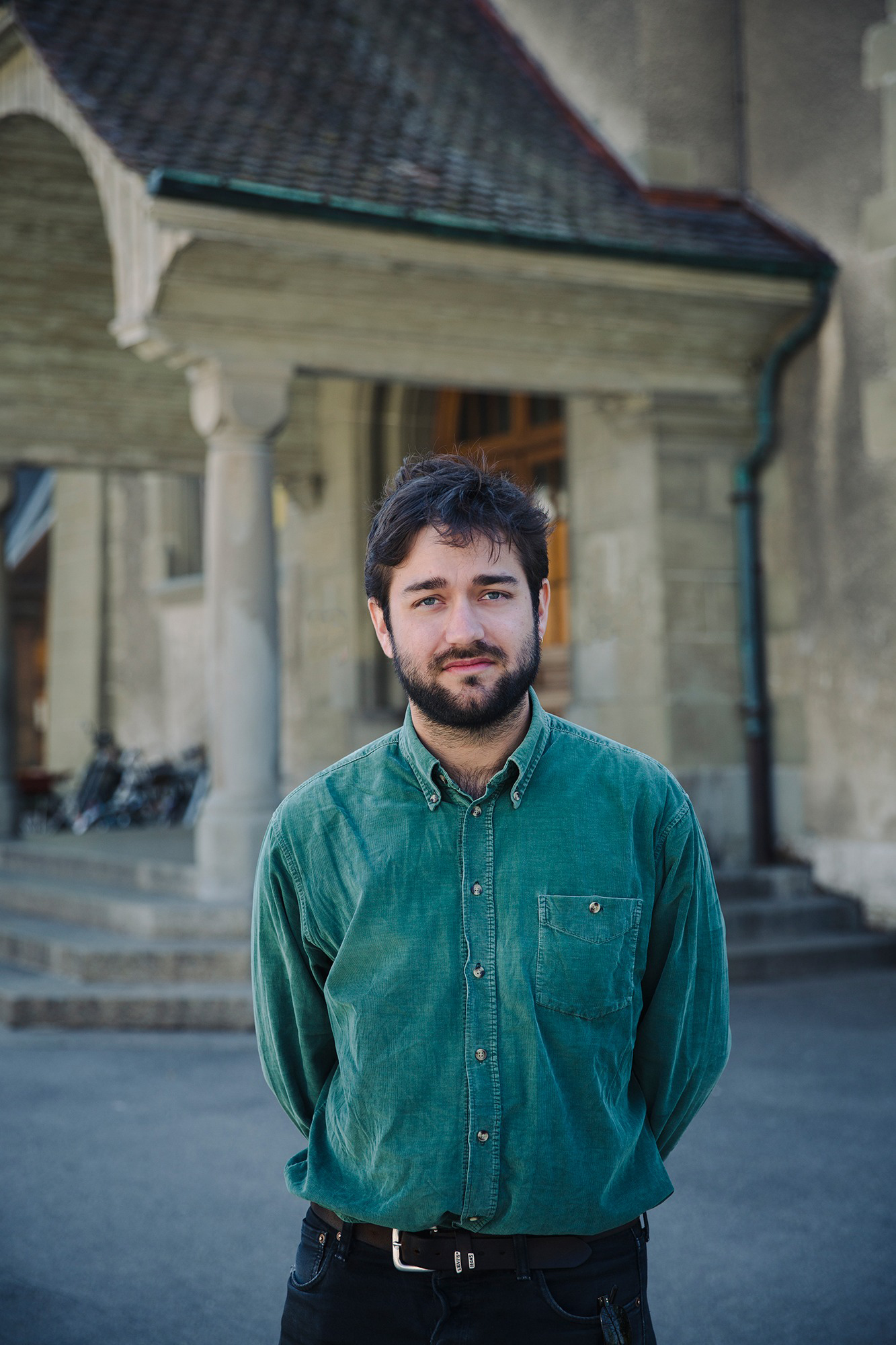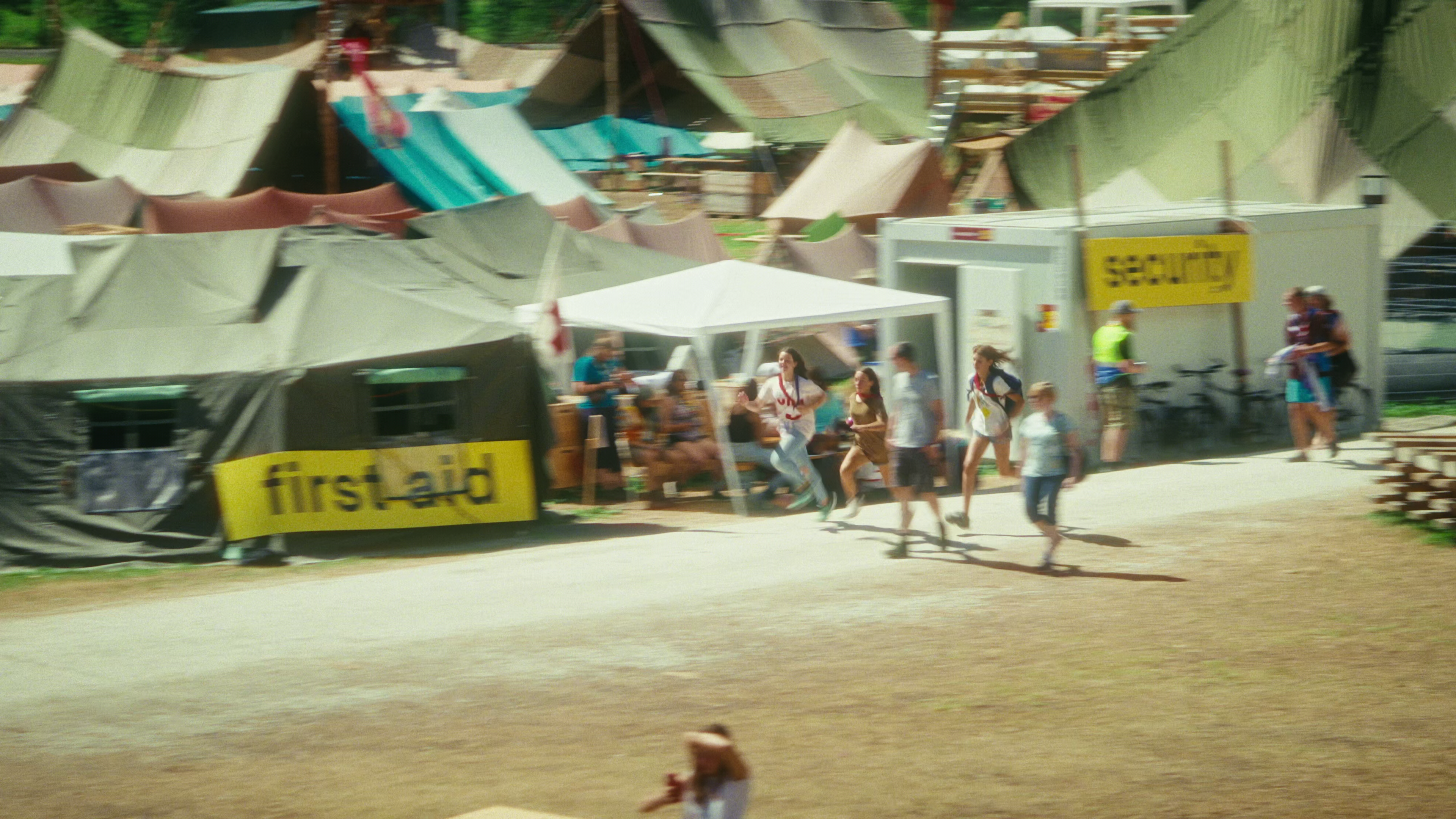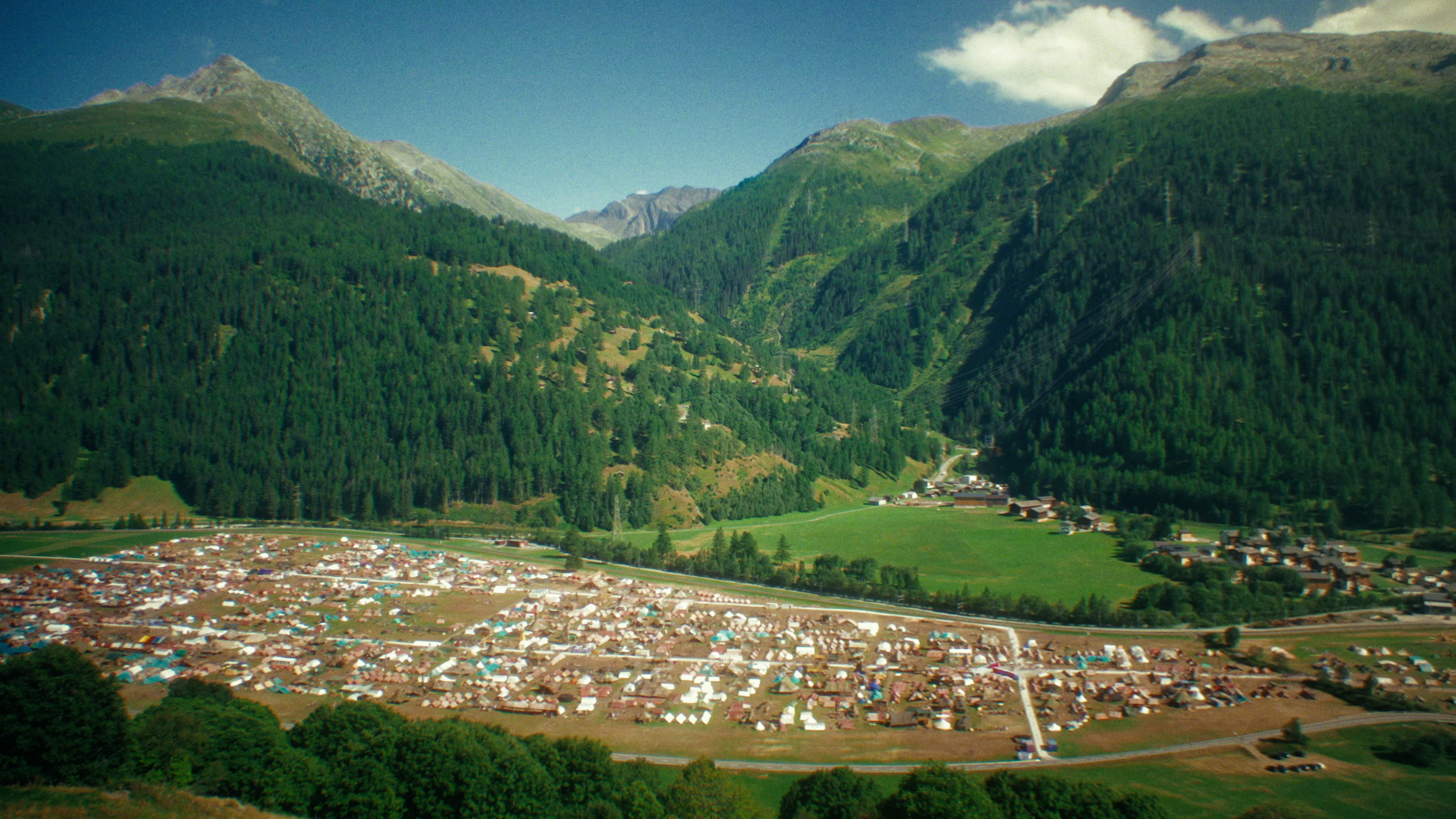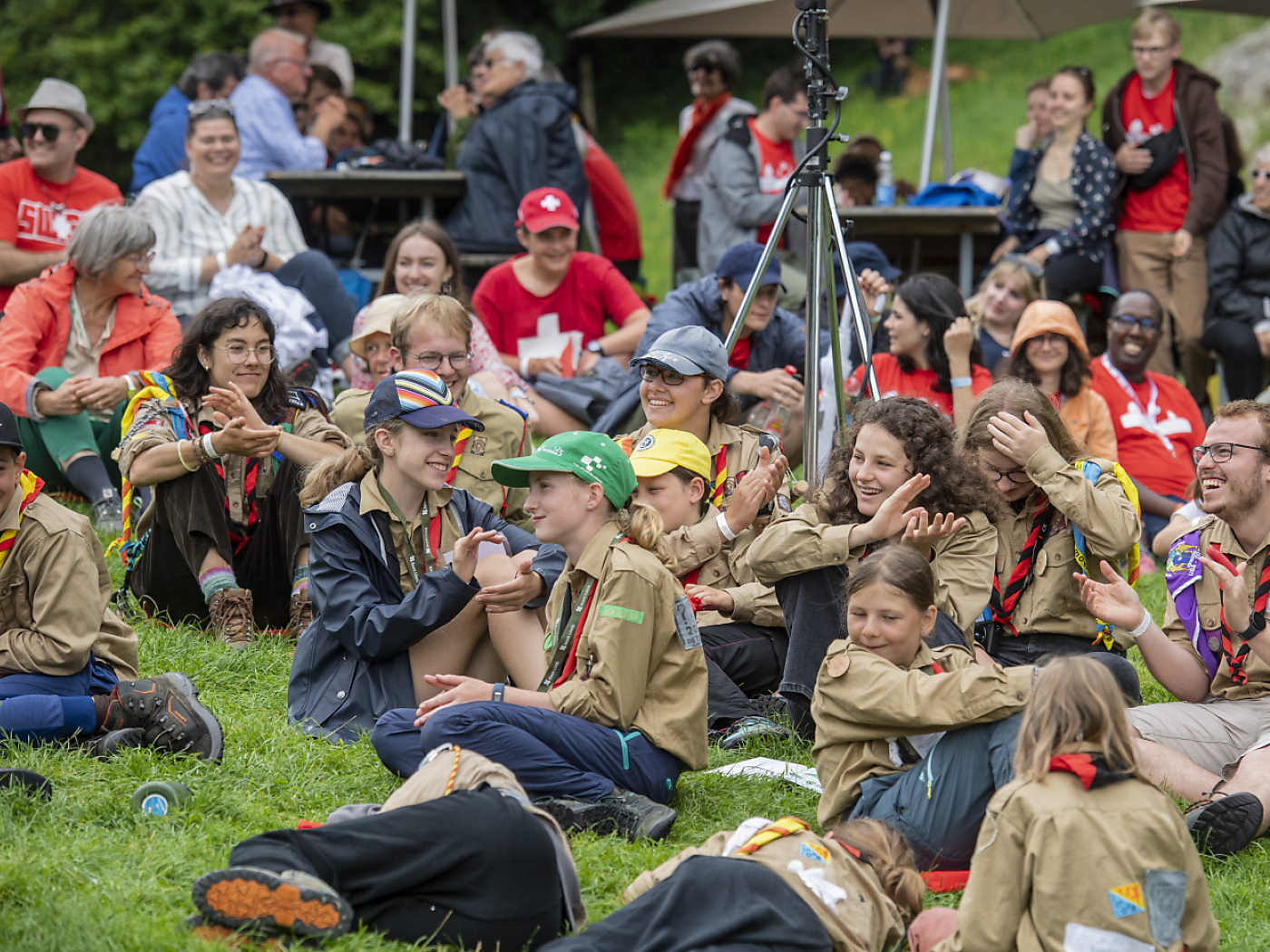
From soldiers to Scouts, a Swiss filmmaker explores youth in uniform

Mateo Ybarra’s previous films portrayed Swiss army conscripts. His new documentary, Camp d'été (Summer Camp), follows a 14-day Scout jamboree in canton Valais, southwestern Switzerland. SWI swissinfo.ch spoke to Ybarra before the premiere in Rotterdam.
As the sun rises, a group of Swiss teenagers trek in single file through the Vallée de Conches in canton Valais. Dawn has broken, the summer sky is slowly turning bright, and the squawk of awakening birds provides a natural soundtrack to their march.
“If you search, if you doubt, if you struggle on your journey, take my hand in yours, and hold on,” they sing in unison. Arriving in a field at the basin of the valley, they take turns raising one hand in the three-finger salute of the Scout Movement. Faltering as they struggle to remember the words, they each repeat their personal oath.
This passage concludes Mateo Ybarra’s Summer Camp (2025), a slow-building, visually luscious new Swiss documentary that depicts a 14-day camp organised by the Scout Movement in southern Switzerland.
In his films to date, the Geneva-based independent filmmaker has focused on young people assimilating – sometimes uncertainly – within Swiss institutions; his first two features, LUX (2021, co-directed by Raphaël Dubach) and Sur Nos Monts (Over Our Hills) (2022), depicted life in the Swiss army for young conscripts.
In the first, we witness a Switzerland-wide drill where recruits must mobilise in response to a fictional left-wing terror attack; in the second, we see the daily life of those enlisted, through vlogs and other scenes of down time. Ybarra’s third film, about the 2022 Scout jamboree in Goms, premiered at the International Film Festival Rotterdam (IFFR) in early February.
Martial values
The Scout Movement is not a major departure from Ybarra’s previous subject matter. The connections between the military and Scouting were, in Switzerland and elsewhere, explicit from the beginning.
The movement was founded in 1908 by Robert Baden-Powell, a British army officer who became fascinated by military scouting procedures when serving in Rhodesia, South Africa and India. It was his belief that a young boys’ movement built around military etiquette, fieldcraft and discipline could be a force for social unity in accordance with traditional martial values.
In 1910 scouting spread to Switzerland, popularised by the writer and translator Gaston Clerc. From the start, it was intertwined with existing military structures and the principles of Protestant abstinence. “Harmful influences are exerted on adolescent youth. Crime literature, pornography, apache-ism are beginning to bear their disastrous fruits!” wrote co-founder Théophile Geisendorf in 1912.
Military conscription for young men had been part of the Swiss constitution since 1848 and the formal establishment of the federal army in 1874. Scouting acted as an induction into military-like procedures for those too young to serve. In 1922, the Swiss Scouts joined the World Organization of the Scout Movement, and the first national jamboree was held in Bern in 1925.
Teenagers in a form
“Somehow, I was never a Scout myself. It’s quite an unknown experience to me,” Ybarra says before the premiere.
In Summer Camp, as in his other films, Ybarra is interested in the way that teenagers and other young people – with their spontaneity, their uncertain desires, their enthusiasm, and their anxious need to forge connections – adjust to the strictures of a regimented organisation like the army or the Scouts.
“Even when you just put a camera in the middle of 35,000 of them, everyone turns to wave at the camera or scream into the microphone, things like that. It’s not easy. They do what they want.”

Ybarra illuminates both the workings of the organisation in a practical sense – its rituals, its methods of imposing order and structuring daily life – and shows the kids rebelling, in ways big and small, against those same procedures.
Nonfiction filmmakers usually like to take their time, spending days, weeks, or even years with their subjects, waiting for them to lower their guards and behave as if the camera isn’t following them.
Part of the challenge in making Summer Camp was that, as with the ten-day terrorism drill in LUX, time is limited. “Ordinarily, you want to spend as much time as you can with your subjects. We obviously didn’t have that,” he says.
Asked about the origins of his ongoing interest in such time-specific events, he offers a practical answer. Ybarra says he looks for subjects that will fit around his job at the film festival Visions du Réel.
“I work there eight months in the year, so for the moment, I search for subjects that mean I can shoot in my free months,” he says. “In 2019 we shot that ten-day military exercise, and now we’ve shot an event by the Scout Movement that lasted 14 days. That’s my starting point.”

Shooting according to life’s schedule
Organising a film festival in a limited period requires intense planning and focus. I point out that his time- and location-restricted projects may stem from a similar need for the reliability of regimentation, order and the limiting of unnecessary anxiety.
“Absolutely,” he smiles. “My mind goes everywhere all the time. I can’t control it. Once I draw a strict line [around my subject], I can finally allow myself, knowing those limits, to explore, to go anywhere within those boundaries with absolute freedom.”
Ybarra shoots the camp’s activities mostly in colourful, stately compositions that emphasise collective rhythms between the vast numbers of Scouts as they mill around in these outdoor spaces. We see flirting, drinking and messing around and follow one group of French-speaking Scouts in particular.
In one sequence, we see a squabble erupt from nowhere between two young Scouts resting on the grass; Ybarra observes the whole incident in an unadorned long shot. “We wanted to film with as much freedom as possible, and there are 35,000 kids there, and you cannot have the full authorisation of every parent. That’s why we decided to focus on one group for which we could get the authorisation beforehand.”

The importance of insignificance
It was also important to depict the specifics of the event, to explore it as something happening in Switzerland in 2022, rather than as something vague and universal. Swiss filmmakers “so often go abroad in search of stories to tell”, he says.
“There are things to talk about within Switzerland, even if it’s somehow a little insignificant or not obvious. These stories still have their specificities. This one, for instance, shows a Scout Movement that’s updated for our time – they are not allowed to make fires today, which was one of the key aspects of Scouting in Switzerland for so long. From there, you also see [the participants] begin to make sense of the rules of this world, adapting to the sense of order imposed on them. You can observe all that by paying attention.”
In Summer Camp, Ybarra isn’t searching for an easy thesis or taking overconfident swings at grand themes. He has a painter’s eye for an impeccable composition, but the film is light and free flowing, not stiff or overly formal. The natural contrasts that emerge from spending time with his subjects do the talking on his behalf.
“For me, all these films are about the clash of the contemporary with the specific structures of Swiss institutions,” he says. “You have uniforms, everybody has to follow the same routine. So with that established, you can clearly observe those who go outside the rules, who resist them. And that’s not just something conceptual; it’s also visual – I like to see how that looks.”
Edited by Catherine Hickley/ts

More
Swiss Scout Movement receives prestigious award

In compliance with the JTI standards
More: SWI swissinfo.ch certified by the Journalism Trust Initiative


























You can find an overview of ongoing debates with our journalists here . Please join us!
If you want to start a conversation about a topic raised in this article or want to report factual errors, email us at english@swissinfo.ch.